Pity the Nations: Women Refugees in Lebanon
Syrian women and girls living in Lebanon face violence and sexual exploitation as they are used as a form of currency in military ventures.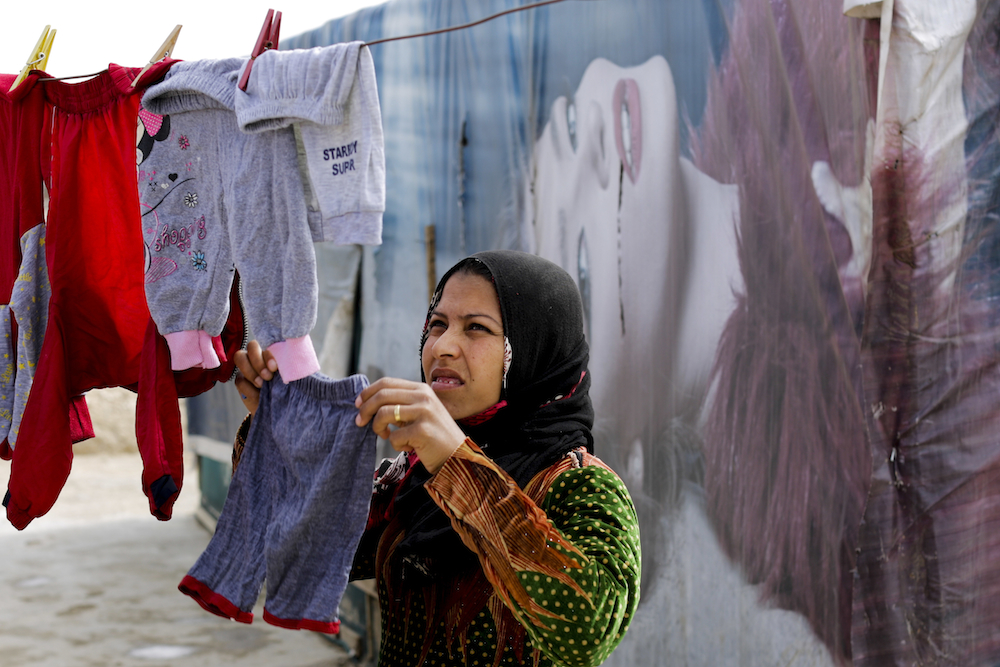 A Syrian refugee hanging her laundry at an informal refugee camp in Lebanon's Bekaa Valley. (Hassan Ammar / AP)
A Syrian refugee hanging her laundry at an informal refugee camp in Lebanon's Bekaa Valley. (Hassan Ammar / AP)
Editor’s Note: This two-part series explores the situation of Syrian women refugees in Lebanon. Part I illuminates the political background that led to the refugee crisis and its particular consequences for women. Part II shows how refugees and the organizations that assist them are playing a leading role in combating all forms of violence against women and creating programs that will give them a future.
Pity the nation that acclaims the bully as hero, and that deems the glittering conqueror bountiful. … Pity the nation whose statesman is like a fox, whose philosopher is a juggler, and whose art is the art of patching and mimicking.
—Khalil Gibran
In 1923, Lebanese poet, philosopher and artist Khalil Gibran wrote “Pity the Nation,” a poem that is particularly meaningful during our current global crises of leaders, nations and nationalism. Renowned journalist Robert Fisk used Gibran’s title, “Pity the Nation,” for his trenchant history of the Lebanese civil war from 1975 to 1990, a war in which Lebanon’s neighboring country of Syria played a leading role.
Lebanon is never far from Syria in history and politics. Today, as foxlike statesmen juggle Lebanon and Syria in their regional maneuvers, Gibran’s words are sobering. The unbreakable web trussing these two countries together, while Syria experiences the culmination of its own civil war, could be lamented as “Pity the Nations.”
In October, I was part of a nongovernmental organization visit to the Syrian refugee camps in Lebanon. We were a team of three from the international Coalition Against Trafficking in Women, Italy’s Association IROKO and the American Traprock Center for Peace and Justice. Our goals were to document not only the situation of women in the camps but also to spotlight the significant role that women are playing as political actors, combating all forms of violence against women and creating programs that give them a future.
We traveled from Beirut to a town roughly three miles from the Syrian border in the Bekaa Valley. More than 365,000 of Syria’s registered refugees live in this poorest region of Lebanon. We walked through labyrinthine lanes of makeshift shelters housing hundreds of refugees, euphemistically called a camp. In actuality, this “camp” was nothing more than a patchwork of improvised structures that looked like pieces of a jigsaw puzzle that never quite fit together.
There are several portable toilets throughout the camp, but the refugees told us they don’t use them because they are filthy. Instead, they create pits outside their tents to dispose of human waste. Those in tents on the edge of the camp dump their waste into shallow gullies where children often play. Many refugees have lived this way since 2011.
Since the beginning of the civil war in Syria, 1.5 million refugees have fled to Lebanon. Earlier, over 450,000 Palestinian refugees also had sought refuge in the country. In contrast to Syria, Lebanon is a small country, with a population of 6 million. This means that refugees make up one-third of the Lebanese population, the highest concentration of refugees per capita of any country in the world.
It’s important to understand the rabbit hole into which Syrian refugees have fallen in Lebanon. Although the country has not closed its borders, it does not recognize the fleeing Syrians as refugees. There are no official refugee camps in Lebanon, so these people must fend for themselves. Refugees cannot obtain residency or work permits and are often forced to rent land from extortionate landlords. The government provides no tents, no food or water, and no sanitary facilities. Syrian children cannot be educated in Lebanese public schools.
Women and girls make up almost 53 percent of the refugees. Before the civil war, Syria had one of the highest rates of educated women in the Middle East. UNESCO estimates that since the war, Syrian girls are almost 2.5 times more likely than boys to be kept from attending school in conflict zones.
Since the beginning of the war in 2011, nearly 14,000 women and girls have been arbitrarily imprisoned in Syria, where many have been raped and tortured. A 2016 nongovernmental organization report found the Syrian government guilty of arresting women for purposes of trading them for weapons. Even Syrian rebel groups have captured women in an attempt to use them as bargaining chips for their fighters held as hostages.
In Lebanon, landlords have demanded a woman or girl from families that can’t pay the rent. Desperate families have traded women into marriage for various goods and services. Eman Obeid, a refugee now working for the Danish Refugee Council, said, “It’s like the price of a year rental is a young female.”
Syrian women crossing into Lebanon, especially single women, have reported violence and sexual assault at the border and after they enter Lebanon. Hada, one of the refugees we interviewed, shared her own brutal experience: Married in Syria at age 13, she left the country when a sniper injured her 5-year-old son in 2012. At the border crossing, one of the guards heard the boy say, “[Syrian President] Bashar [Assad] is a jackass.” They became violent with her and interrogated her for 12 hours.
When she arrived in Lebanon, she met a group of women who brought her to a large house with many other women. Hada noticed a steady stream of men entering and leaving at all hours, and when she asked the woman running the house what was going on, she said, “You give them favors, they give you favors.”
In the early hours of the morning, Hada fled the house with her son. After walking for many hours, she found a construction site shack where they stayed at night. During the day, she begged on the streets and in the back of restaurants for food. Not wanting to tell us what subsequently happened to her, she gave permission to her nongovernmental organization caseworker to divulge that she had been gang-raped. As author Janine di Giovanni has written, “It’s so hard to remember what you wish you could forget.”
Later, Hada met her second husband, whom she married “mostly for protection” but who battered her. The caseworker added that, in addition to the rape she experienced during her journey into Lebanon, Hada was abused by her father as a child and by her first husband in Syria. She now has serious health problems. “It’s amazing that she’s still alive,” the caseworker said. “She and her young son, who witnessed his mother’s gang-rape, are receiving assistance.”
In 2013, the International Rescue Committee (IRC) said that reports of mass rape in Syria were “the primary reason … families fled the country.” In Syria, rape has become weaponized, with most reported crimes committed by pro-government forces during regime incursions into opposition areas, interrogations in prisons and at checkpoints.
Many women raped in detention were either political activists against the Assad regime, relatives of activists, residents of opposition strongholds or resistance fighters. In some detention centers, guards distributed contraceptive pills or abortifacients to women. The availability and distribution of these pills attest to planned medical intervention and the fact that widespread rapes were part of a strategic state policy of repression.
Rape is always a primary tactic in war. Some scholars note that rape in war is more frequently perpetrated on women than on men. And the consequences of what men and women suffer in detention are different. Male detainees are often hailed as heroes for what they have endured in combat and prison. But women detainees are not honored for being raped and often will conceal what has happened to them. They are dishonored if they speak about it and are stigmatized as damaged goods.
Nearly every refugee and organization official we spoke with mentioned the growing incidence of early marriage among Syrian refugee girls. The IRC staff member we interviewed said that since the Syrian conflict, there has been a 23 percent increase in early marriages of girls, especially in the Bekaa Valley. She also noted the “huge gap” in marital ages between the young girls and older men.
Early marriage was a traditional practice in rural Syria even before the war. Many of the refugee women we interviewed had been married in adolescence, some as young as 13. In the camps, where there is little security for those living in tented areas or abandoned houses, many fathers consider early marriage a safeguard for a girl, as well as income for the family.
Child marriage can easily obscure what effectively amounts to coercion, because girls cannot give informed consent to a relationship that is essentially controlled by her father or other relatives, and later by a husband. The girl cannot leave or end the marriage, potentially leading to a lifetime of legal sexual exploitation and/or domestic servitude.
She will have little control over her reproductive life and health, especially if she has children at an early age.
Early marriage increases the confinement of girls in the home, particularly where the cultural expectation is that boys venture out and can take care of themselves, but girls need to be protected. As a result, girls are more likely to be kept inside and become adults who seldom leave their dwellings, and then only with a male family member. The IRC staff member remarked that she has seen entire villages of homes with carpeted windows through which no daylight shines, allegedly so no potential predator will see the women and girls and kidnap them.
Sex traffickers are exploiting women refugees for prostitution. In 2016, Lebanese authorities broke up a sex trafficking ring of 75 women north of Beirut. Desperate to leave Syria, the women involved had been promised jobs in Lebanese restaurants and hotels. As soon as they crossed the border, all their possessions were taken, and they were locked up in two hotels and held prisoner.
Workers from KAFA (meaning “Enough”), one of the leading nongovernmental organizations in Lebanon providing services to victims of violence against women, told us that the traffickers tortured, raped and forced the women to have sex with 10 to 20 men per day. Lebanese officials reported that the traffickers garnered $1 million per month. Four women were able to escape and notify Lebanese authorities, who then arrested eight of the guards. After the arrests, the Lebanese Health Ministry charged a doctor who had allegedly performed 200 abortions on women in the trafficking ring.
In the Bekaa Valley, we interviewed a Syrian woman I’ll call Rima. Rima had been trafficked into a forced marriage by a man who had offered to help carry her handicapped sister to Lebanon. She discovered he was a pimp when he compelled her to have sex with men he brought to their quarters. Later, she found out he had pimped other women. When we asked if there were women in the camps whose husbands were selling wives or daughters for sexual exploitation, she told us there was “much talk about women who were trying to obtain divorces because husbands had sold them or threatened to sell them.”
Yet media and international organizations continue to describe accounts of trafficking and prostitution as “sex work.” The term is increasingly being slipped into reports that quite clearly document the most horrific aspects of women’s sexual exploitation. There is a disconnect between the reality and the language used to describe sex trafficking and prostitution.
In a report funded by the Freedom Foundation titled “Struggling to Survive: Slavery and Exploitation of Syrian Refugees in Lebanon,” the author recommends improving anti-trafficking legislation by amending the penal code so that victims of sex trafficking cannot be prosecuted for engaging in “sex work.” Of course, no victim should be prosecuted for her exploitation. However, what we increasingly see in many nongovernmental and U.N. reports on sex trafficking is the term “sex work” applied to prostitution, and the disturbing trend to separate sex trafficking and prostitution in order to institutionalize the distinction that trafficking is forced and prostitution is voluntary.
The continued normalization of prostitution has been stamped with the U.N. imprimatur in the “UNAIDS Terminology Guidelines,” which advises authors to use “sex work” and “sex worker” instead of “prostitution” and “prostituted woman,” allegedly because they are nonjudgmental terms. But “sex work” is filled with judgments about how prostitution should be viewed and legislated as a “sexual service.” Surely the term “sex worker” doesn’t dignify Syrian women refugees, or any woman who has been prostituted. It mainly dignifies the pimps and buyers and renders the harm to prostituted women invisible.
Your support is crucial...As we navigate an uncertain 2025, with a new administration questioning press freedoms, the risks are clear: our ability to report freely is under threat.
Your tax-deductible donation enables us to dig deeper, delivering fearless investigative reporting and analysis that exposes the reality beneath the headlines — without compromise.
Now is the time to take action. Stand with our courageous journalists. Donate today to protect a free press, uphold democracy and uncover the stories that need to be told.

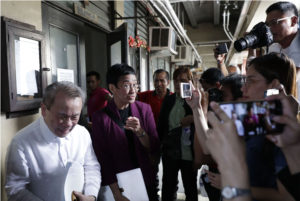
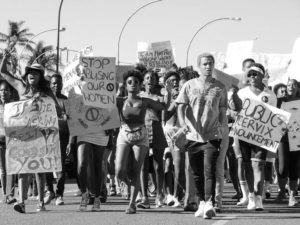
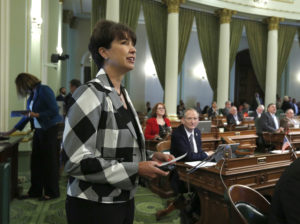

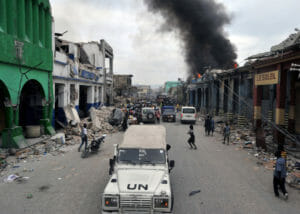
You need to be a supporter to comment.
There are currently no responses to this article.
Be the first to respond.